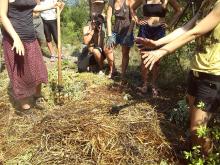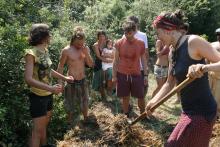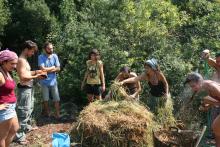Day 7 Waste Management and Croatian Culture
Modern life produces unbelievable amounts of waste. We all know about recycling, but another valuable way to reduce waste is to compost organic material, and turn it into valuable rich soil. Fruit and vegetable scraps, lawn clippings, tree prunings, dried leaves, animal manure, coffee grounds, egg shells, and much more can be seen not as waste, but as valuable resources. Especially in areas with soil erosion, compost is a great way to kickstart regenerating soils and building more complex ecosystems. Today, we learned the theory and practice of composting.
Composting is a simple skill that anyone can do. Depending where you live – whether it’s in an urban appartment or on a farm – there are different techniques you can use to compost plant materials and animal waste. We learned how to make a cubic meter hot compost pile that, with some maintenance, will decompose into soil in only 4 weeks. In untended nature, the same processes of decomposition take 6 months to a year. Our compost pile was built over a shallow hole lined with branches to let the pile drain and so it won’t rot. We then layered carbon rich brown material like straw and dried leaves with nitrogen rich green material like kitchen scraps and weeds pulled from the garden. It’s important not to put fatty or fried foods, dairy or meat, since the oils will block the air flow, and rodents are attracted to these foods. With the proper ratio between carbon and nitrogen, the proper moisture level and oxygen flow, microbial life will work quickly and efficiently to break down all the organic material, heating the pile to over 65 degrees celcius in the process!
We learned how to build the most effective pile, how to maintain it, and how to troubleshoot problems. The 30 of us worked together, pulling weeds, wetting straw, and layering the pile. We saw how composting is an easy way for individuals, families, and farmers to help the land recover from exploitative chemical-based industrial agriculture, which destroys soils and kills the life in them. Building compost is a simple and manageable way to regernate soils and create healthier, organic food. Even cement urban areas can grow food in pots, on rooftops, in gardens, etc, using compost as the soil. Fertilizers are made in destructive ways, contain only several elements, and are devoid of life. Compost provides more benefits to plants and insects, creates stronger and more complex biological communities, and is a living community in which diverse life continues to grow and reproduce itself. All we have to do is give it a good start, by changing the way we think about waste.
After a productive morning of composting and a healthy lunch, about 20 of us embarked on an afternoon walk to the nearby town of Vlachia for some beer on a patio overlooking the beautiful Agean Sea. From there, we walked 3km down the winding paved road to a beach. Only one car passed us. A few locals were resting at the small food stand or on the black stone beach. We camped out on the far side and swam out to some rocks protruding from the water. It was a silly afternoon of diving, international swim competition, campfire, and exploring the coast. It was dark by the time we left the beach stand and walked home under the light of the full moon. A delicious Croatian dinner awaited us at our camp: root vegetable stew, “popetchki” (vegetable fritters) and salad, with “buchnica” and “shtrukli” (pumpkin and cheese pasteries) for dessert. After all the bellies were filled, the musically inclined played into the night while others laughed and played clapping games and other circle games.
- 629 reads






